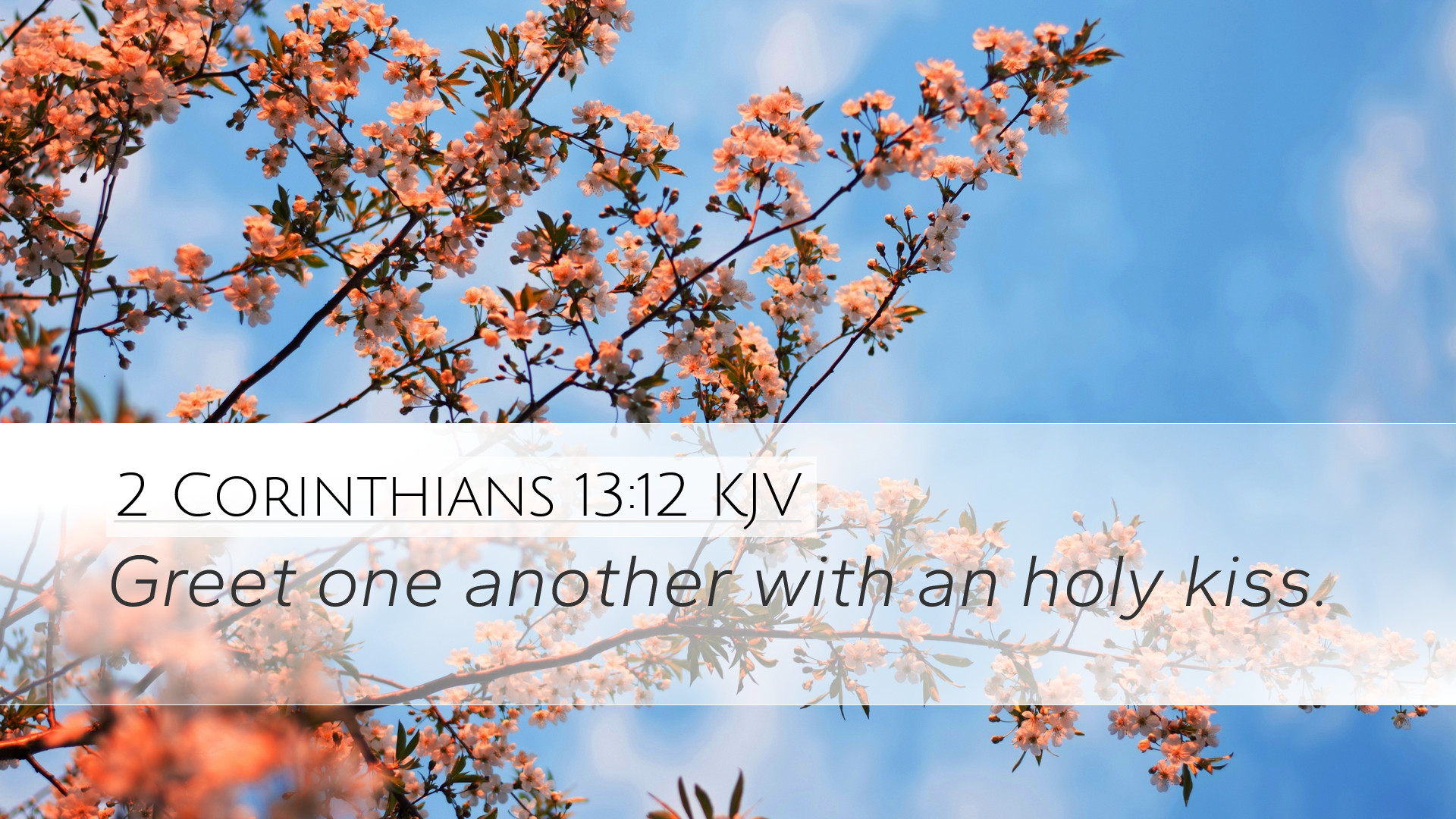Old Testament
Genesis Exodus Leviticus Numbers Deuteronomy Joshua Judges Ruth 1 Samuel 2 Samuel 1 Kings 2 Kings 1 Chronicles 2 Chronicles Ezra Nehemiah Esther Job Psalms Proverbs Ecclesiastes Song of Solomon Isaiah Jeremiah Lamentations Ezekiel Daniel Hosea Joel Amos Obadiah Jonah Micah Nahum Habakkuk Zephaniah Haggai Zechariah Malachi2 Corinthians 13:12
2 Corinthians 13:12 KJV
Greet one another with an holy kiss.
2 Corinthians 13:12 Bible Commentary
Commentary on 2 Corinthians 13:12
Verse: "Greet one another with a holy kiss. All the saints greet you."
Introduction
The final chapter of Paul's second letter to the Corinthians culminates with personal exhortations and affectionate farewells. In 2 Corinthians 13:12, the Apostle Paul emphasizes the importance of unity, love, and communal bonds among believers through the act of greeting one another with a "holy kiss."
The Meaning of the "Holy Kiss"
In the ancient Mediterranean world, a kiss was a common greeting that signified affection, respect, and camaraderie. The addition of "holy" to the description of this kiss indicates that the greeting is to be infused with spiritual significance.
- Matthew Henry emphasizes that the "holy kiss" symbolizes the love and unity that should exist among believers. It serves as an expression of mutual respect and spiritual fellowship.
- Albert Barnes suggests that this practice, while cultural, can still resonate today as an indication of warm fellowship. The essence of the command is not in the act itself but in the underlying principle of love and acceptance among Christians.
- Adam Clarke notes that this kiss was not merely an external formality; it represented the depth of association believers are called to share. Clarke also stresses that such gestures should be free from hypocrisy, embodying true Christian love.
Significance of Greeting Among Believers
The act of greeting one another holds profound theological implications. By encouraging this practice, Paul advocates for an intimate and personal relationship within the body of Christ.
- The “holy kiss” acts as a reminder of the believer's identity in Christ, where all divisions of class, gender, and ethnicity are transcended.
- It serves as an antidote to division and discord, fostering an environment of love and acceptance, as noted by Henry.
Broader Context of 2 Corinthians
Understanding this verse also requires an awareness of the broader context of the letter. Paul had addressed various issues of conflict, misunderstandings, and moral failures within the Corinthian church. His encouragement to greet one another was not merely a pleasant closing but an imperative call for reconciliation and unity.
- Barnes points out that the expression of greetings was used throughout the early church, highlighting a community lifestyle that prioritized personal connection and relational integrity.
- Clarke argues that these personal endings often reflect deeper doctrinal concerns as they encapsulate core messages of love and community.
The Role of Saints in the Community
The phrase “All the saints greet you” not only extends the warm affection from Paul but also invites recognition of the collective identity of believers.
- This acknowledgment of "saints" serves to unite the church as a body whose members are called to be holy and separate from worldly practices.
- The term reinforces the idea that every member has a role to play in the spiritual family, as emphasized by both Henry and Barnes.
Application for Today’s Church
For modern believers, 2 Corinthians 13:12 calls for reflection on how we express love, unity, and acceptance among ourselves. The implications are vast and can be integrated into today's church life.
- Creating a Welcoming Atmosphere: Churches should foster environments where genuine greetings reflect heartfelt unity and affection.
- Cultivating Unity: Leaders and congregations alike should promote practices that encourage reconciliation and diminish strife.
Conclusion
In summary, 2 Corinthians 13:12 invites believers to embrace a culture of deep relational connection, characterized by love, respect, and holiness. As the Apostle Paul closes his letter with these affectionate commands, he reminds us that the heart of the gospel is not only individual piety but also the communal bond shared among the children of God.
By greeting one another with a holy kiss, believers embody the love of Christ and reflect the unity that ought to pervade the body of Christ. This timeless exhortation continues to resonate in our churches today, calling each of us to express our faith through love, acceptance, and honor.


